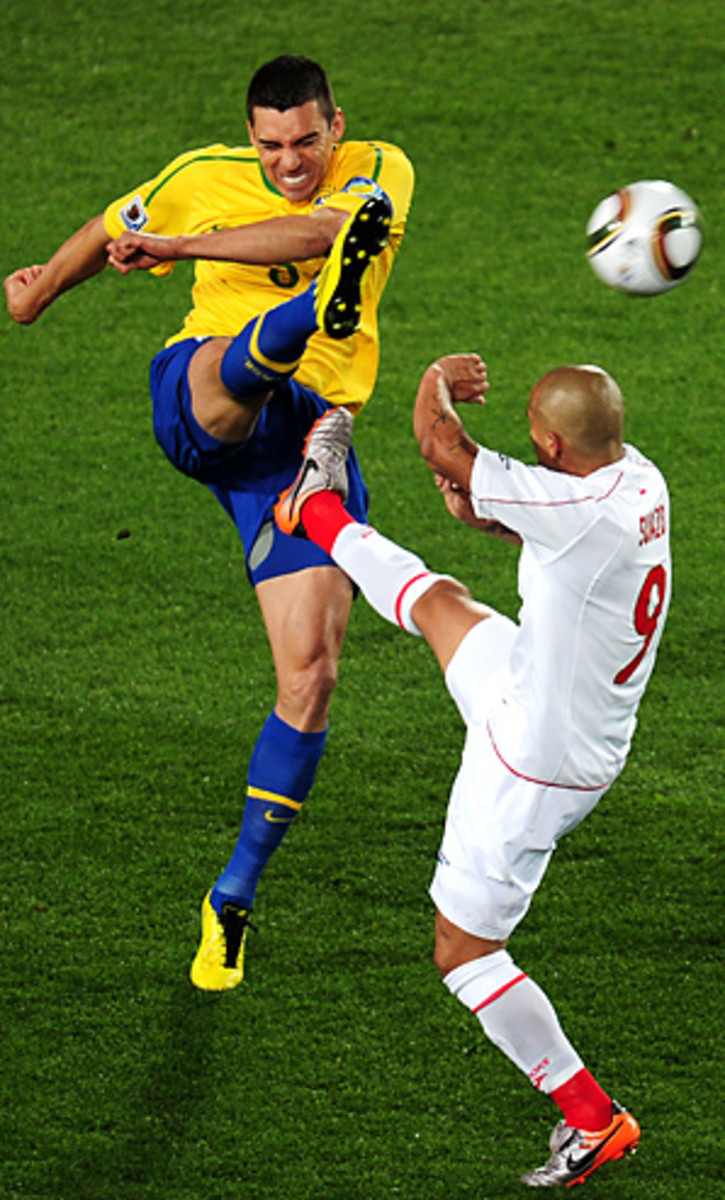Brazil makes short work of Chile
Though history was resolutely on the side of Brazil, which had won 46 of 65 encounters between these nations before Monday's encounter, there was hope among the neutrals that today's match with Chile would be at least peppy and close. Chile's group performances had been exciting and shown no small amount of swagger; Brazil had produced moments of inspiration against North Korea and Ivory Coast but relied more heavily on its pragmatic side to come through its meeting with Portugal.
In the opening few minutes Chile delivered the we're-not-scared-of-you attacking soccer expected, forward Humberto Suazo making a nuisance of himself in the final third. But he never really escaped Brazil's attentions for long enough to pose a real threat. Once, after the first five or six minutes, Brazil snatched possession and held onto it, it looked less and less likely that Marcelo Bielsa's side might progress.
The prediction had been that Chile's willingness to throw itself into attack would leave it wide open at the back, but Brazil was forced to weave patterns around the Chilean defense for much of the first half hour. It was a set-piece that eventually provided the breakthrough. Not only was Juan's goal -- a header from a corner kick that arrowed directly into the top corner without passing Go and collecting $200 -- quite unlike the Brazilian goals that we are used to seeing, but it changed the game completely.
It was only at that point that the spaces appeared in Chile's lines -- it seemed even more determined to stick to its fearless gameplan having gone behind, and Brazil exploited that within minutes. Robinho and Kaka had endured questions about their domestic form coming into the competition, but have sparked like two loose wires meeting on a breeze when played together for Brazil. A few minutes after Juan's goal, Robinho raced down the left with the ball, squared it to Kaka and watched as the Real Madrid man nudged it onto Luis Fabiano's perfectly-timed run with his first touch. They could both stand and admire Fabiano's dribble around goalkeeper Claudio Bravo and the composure with which he slotted the ball into the empty net having done so.
That second goal -- which, 37 minutes into the match, effectively killed Chile's chances -- was as characteristically Brazilian as they come. And it was bettered with the third, after an hour, when Robinho curled the ball beyond Bravo having received the ball from Ramires -- replacing the injured Felipe Melo and surely offering Brazil a more potent option-- who had galloped through the middle of the pitch from the halfway line with the ball, swerving around and in between two defenders before releasing the pass. Chile's central three chased shadows as the Brazilians traced lines all over the pitch, benefitting especially from defender Lucio's rampaging runs out of defense -- he's now clocked up 11 solo runs, the third highest in the tournament so far.
By contrast, Chile's forwards rarely made their way beyond the Brazilian defense, and failed to make goalkeeper Julio Cesar earn his keep when they did. It's natural to praise Chile for never giving up, even having gone down 3-0, but neither did it give a great deal more than wild potshots from distance from Suazo, Mark Gonzalez, and Mauricio Isla. In 90 minutes, Chile registered three shots on target, none of them memorable enough to leave spectators with the impression that they ought to have got something out of the game.
The credit for that, however, should go to Brazil's defense, which, in another un-Brazilian twist, is arguably one of the best at the tournament. Winger Alexis Sanchez had been involved in almost everything of invention and sparkle in Chile's previous matches, but was comprehensively marshaled out of the game by Michel Bastos. The Lyon fullback anticipated every move and cut the supply from Arturo Vidal down Chile's right. Gonzalez and Jean Beausejour fared a little better against Maicon, but were unable to control their crosses having rounded the Internazionale man.
If Brazil's unusual staunchness at the back is the worst Dunga's detractors have to worry about, he will take their criticism all day long. Even without Elano and Melo, the midfield is in rude health; Nilmar's introduction up front was an unnecessary luxury. Dunga has a team that can cope with pressure at the back and deal with balls in the air or on the ground. It can spring from defense to attack in an instant -- not just the pace, but the fluency of Brazil's attacking play will concern the Netherlands, which will meet Brazil in the quarterfinal on Friday. These were the sweeping, one-touch moves from one end to the other that we more frequently see with a Playstation game controller in our hands.






